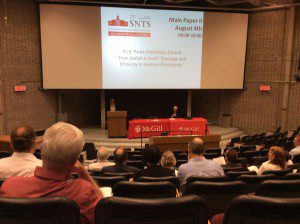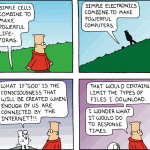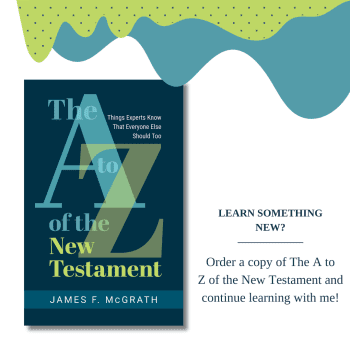
Today’s program started with a service in French. Very few members attend any of these chapel services, but today it was interesting to notice that almost everyone who was there was not a native speaker of French.
Next on the program was the second main paper of the conference, by Paula Fredriksen, asking “How Jewish is God?” Gods were thought of in antiquity as sharing in the ethnicity of their worshippers, often indeed being viewed as the ancestors of the rulers of nations and cities, if not indeed whole populations. And so Fredriksen broached the question of how the Jewish God was viewed in light of this on the one hand, and the insistence that the Jewish God was the universal God on the other. The paper was fascinating, noting the contrast between Genesis 10 and Deuteronomy 32:8-9 on whether other gods are among the ethnic identifiers of nations, and also the idea (found in 1-2 Maccabees and Josephus) that Jews and Spartans were related because of a connection between Heracles and one of Abraham’s granddaughters. The Sabbath was one of the most distinctive ethnic identifiers of the Jewish people, and it was claimed (e.g. in Jubilees) that this practice of theirs came to them because the God who created their nation and set it apart from others kept the Sabbath. Fredriksen has striking ways of making her points, such as when she says “In antiquity, all monotheists were polytheists,” believing that one God is supreme, not that no subordinate beings exist that might be called “gods.” Her paper also drew attention to the fascinating reinterpretation of Psalm 96:5 in the LXX, making the gods of the nations not merely idols but daimonia. Likewise fascinating was the consideration that Paul had no clear designation for the Gentiles who came to worship the one God through his proclamation – they were not converts to Judaism, nor ‘Christians’ (a term not yet coined). The very last point was perhaps the most striking of all: although Jews were linguistically diverse in his time and so language did not serve as an ethnic identifier in the same way it did for other peoples, nonetheless the Gentiles who are in Christ call God abba, using the Jewish tongue, Aramaic.
I initially thought that perhaps Galatians 4 might provide counterevidence. But a I reflected further, I realized that Paul focused on Abraham precisely because he is father of many nations, ethnoi. Ethnic Arabs and ethnic Jews and other Israelites were different ethnicities but children of Abraham. And extending the family imagery, Fredriksen pointed out in the discussion time that the other gods were themselves bene elohim, “sons of God.” Margaret Mitchell asked about how this relates to the mobility of gods around the Mediterranean in the Greco-Roman era. She also noted 1 Corinthians 10:1, where Paul seems to give Gentile Christ believers the shared ancestors of the Israelites, and thus asked whether Paul is consistent. It seems to me the tension for Paul is between the one body in Christ which includes many nations. I was also struck by the way this might change the significance of something else Paul says in 1 Corinthians, talking anout how sharing in the cup of “demons” provokes God to jealousy. Was the issue that these were the gods of the nations as the Psalm says, rather than that they were “demons” in the modern sense.
After a coffee break, we met in seminars. In the John seminar, Jean Zumstein offered a paper on John 6. He argued against diachronic approaches that deny the coherence of the final product, and focused on the intertextual relationships between John’s miracle stories here and the Synoptic equivalents on the one hand, and the Hebrew Bible on the other – hypotext and hypertext, intratextuality and intertextuality, brought together to offer an interpretation of the final shape of John 6. John’s relationship to Mark is different from that between Matthew or Luke and Mark. The Johannine version ends with a crisis, the misunderstanding of the identity of Jesus. John 6 can be read in two different ways, depending on whether the reader already knows about the eucharist. Intertextual interplay is dialectical, as we see when we consider the relationship of the manna story to John 6: not only does knowledge of the manna story change the way John 6 is read, but the latter in turn changes the way Exodus, manna, and Moses are viewed and understood. Susanne Luther was the respondent, and sought less to critique Zumstein, and more to offer a perspective on the topic that draws on her Habilitationsschrift, which is about history and factuality in the Gospel of John. I found this fascinating, having come across earlier today while browsing the book exhibit a chapter by Joel Marcus asking whether Matthew believed his own myths, focusing on Matthew’s introduction of an earthquake into his passion narrative. Luther built on the work of Martinez and Scheffel, treating the distinction between fictional and factual as a pragmatic one, while real vs. fictive has to do with ontology. Dennis MacDonald, in the discussion after, suggested that the eucharistic issue is in view in the earlier layer rather it coming into view in the later redactional layer. Jorg Frey brought up some points that he addressed in a publication on the feeding of the 5,000 in Mark and John, arguing that John alludes to the narrative about Saul in 1 Samuel, with a young boy involved and Saul hiding when they want to make him king. The wider context of John’s Gospel was also brought up – how does the later insistence of “the Jews” that they have no king but Caesar impact consideration of the historicity of the attempt to make Jesus king in John 6? In response to a question from Johanne Beutler, Zumstein emphasized the difference between his perspective and that of Rudolf Bultmann: In John 6 we have the interpretation of eucharist within the developing Johannine tradition – out of and in continuity with it rather than in opposition to it.













